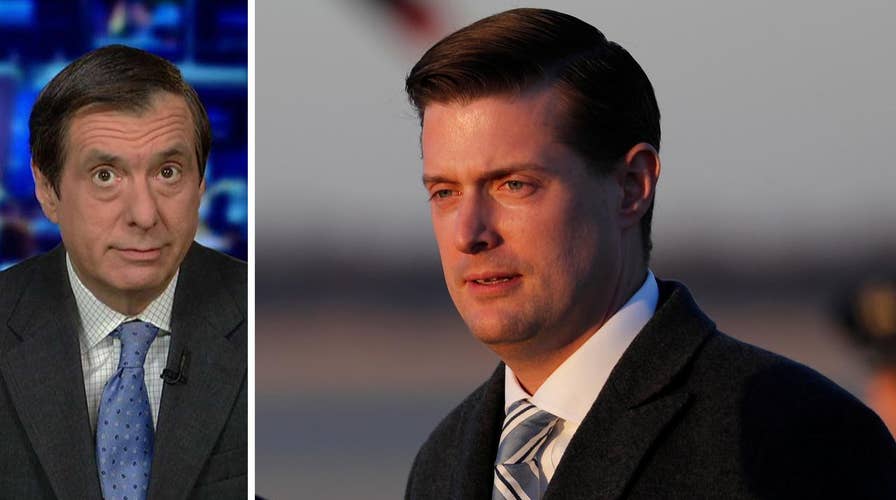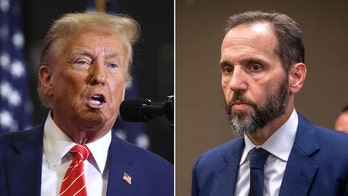Kurtz: A troubling conversation on spousal abuse
'MediaBuzz' host Howard Kurtz weighs in on how the accusations against Rob Porter are turning a political debacle at the White House into a serious conversation about domestic abuse.
What began as a political debacle at the White House is turning into a serious conversation about domestic abuse.
The press, of course, is not done demanding answers, especially after yesterday's Hill testimony by FBI chief Christopher Wray. He said the bureau had first provided a partial report on Rob Porter last March—months earlier than the White House has acknowledged—a completed report in July, and followup information in November.
But if we can put politics aside for just a moment, we are hearing more from the women involved. And their accounts of living with domestic violence are moving and deeply troubling.
It's important to note that these women didn't seek the spotlight. In Porter's case, Colbie Holderness, his first wife, and Jennie Willoughby, his second wife, shared their harrowing accounts during the FBI background check when he was named White House staff secretary. They did not gin up a campaign to go public.
But when the story exploded last week and Porter vehemently denied engaging in any domestic abuse, they wanted to tell their side.
It reminds me of the women who accused Roy Moore of sexually pursuing them as teenagers four decades ago, but never went public until a Washington Post reporter approached them during his failed Senate campaign in Alabama.
Willoughby went first. She sat down with CNN's Anderson Cooper and NBC's Savannah Guthrie, then wrote in Time that the White House made her feel like Porter's "professional contributions are worth more than the truth. That abuse is something to be questioned and doubted."
Now Holderness, whose infamous black-eye photo undoubtedly sealed Porter's political fate, has written a column for the Post, declaring that "recognizing and surviving in an abusive relationship take strength." (She is responding in part to Kellyanne Conway, who told CNN she had no reason not to believe the two ex-wives and also praised Hope Hicks, who had been dating Porter, as "so strong.")
"For me, living in constant fear of Rob's anger and being subjected to his degrading tirades for years chipped away at my independence and sense of self-worth. I walked away from that relationship a shell of the person I was when I went into it, but it took me a long time to realize the toll that his behavior was taking on me."
Holderness said it took strength to talk to family, friends, clergy, counselors and the FBI: "Then there is the just-as-serious issue of being believed and supported by those you choose to tell. Sometimes people don’t believe you. Sometimes they have difficulty truly understanding what you are trying to tell them.
"I had to take an extended leave from graduate school because I was depressed and unable to complete the work. When I finally left Rob for good, my self-confidence was so destroyed that I was too scared to apply to any jobs other than that of server at a restaurant. It has taken me years to get my professional life back on track."
Another woman, Jessica Corbett, appeared yesterday on the "Today" show. She is the ex-wife of David Sorenson, who was ousted last week as a White House speechwriter. Sorenson insists he never engaged in any violence against anyone.
Corbett, responding to President Trump's comment that the accused men deserve due process, said her ex-husband "got due process when I answered the FBI agents truthfully."
Corbett said on "Today" that Sorensen had thrown her into a wall and burned her with a cigarette during their 2-1/2-year marriage. "He made me drive around for hours, wondering where I would go, with no money, to beg people for cash so I could go home. He cut my credit card off, drained my bank account, told me I would be homeless."
She added: "People accuse me of trying to bring a good man down, but all I did was tell the truth. I wasn't out to get him, I was not trying to get him denied this job by telling the truth. I do very much believe he is one of the best and most capable people at what he does professionally."
To be sure, the political storm at the White House, in light of the FBI account, will rage on. But these women, who had long remained silent, are getting at something deeper in our society.





